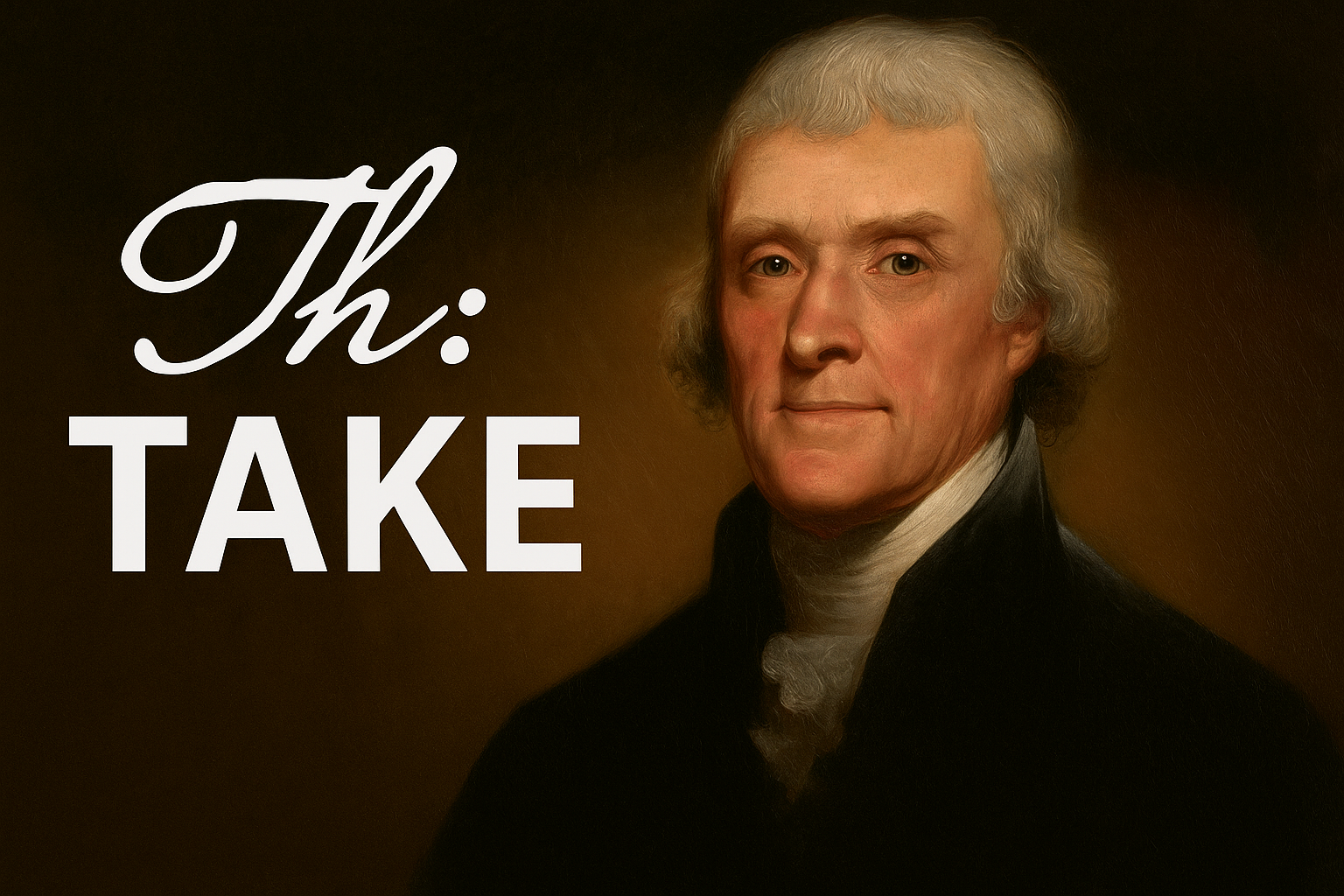Opinion. insight. solutions.
Credit: Thomas & AI
Opinion By Ben Everidge for Thomas
Tariffs Are Taxes America Can’t Afford …
“Tariffs aren’t just taxes on foreign goods. They’re taxes on us. Every extra dollar at the checkout line is proof that political gridlock in Washington too often disguises itself as economic patriotism. The real question isn’t whether tariffs protect America, but whether they’re quietly punishing the very Americans they claim to defend.”
- Ben Everidge
Thomas Jefferson often signed his name “Th:” – a reminder that wisdom, brevity, and clarity can still guide us.
At Thomas Mediazine, our Th: Take premium edition offers opinion, insight, and solutions to the toughest challenges of American politics, always from a politically independent perspective.
Today’s subject: tariffs.
The Thomas View on Tariffs
Donald Trump has proposed sweeping tariffs as a central feature of his economic plan. The argument is straightforward on its face: raise tariffs on imported goods, penalize foreign competitors, and bring American jobs back to the United States. It’s a message that appeals to frustration about globalization and decades of job losses in U.S. manufacturing.
But the reality is very different. Tariffs are not fees paid by foreign governments. They are taxes on American businesses and consumers. When tariffs are imposed, the costs are passed along in the form of higher prices at the cash register, increased input costs for small businesses, and reduced purchasing power for households.
In effect, tariffs are hidden taxes, and they hit hardest in places that can least afford them.
Why Tariffs Drive Inflation
Americans have endured years of inflation that stretch back into the Biden administration. Food, fuel, rent, and health costs have taken a larger share of household budgets, leaving many families with little breathing room. Adding tariffs on everyday goods, from electronics to clothing to auto parts, would pour gasoline on the fire.
Consider a few examples:
Household goods: Tariffs on imported appliances mean higher costs for families trying to replace a broken washer or dryer.
Small business inputs: A Florida contractor who relies on imported steel or lumber pays more, making local projects less affordable.
American exports: Retaliatory tariffs from other nations shut American farmers and manufacturers out of global markets.
History shows tariffs invite retaliation, depress exports, and strain diplomatic relationships. The Smoot-Hawley Tariff Act of the 1930s deepened the Great Depression. More recently, Trump’s 2018 steel and aluminum tariffs triggered higher costs for U.S. manufacturers and backlash from trusted allies.
The Missed Opportunity
An America-first policy should strengthen U.S. competitiveness, not weaken it. By clinging to tariffs, we risk:
Higher household inflation when families are already struggling.
Lost global opportunities for American businesses, especially farmers and exporters.
Weaker alliances at a time when international cooperation is vital for security and trade stability.
Instead of taxing Americans through tariffs, we should be investing in:
Workforce development: Preparing the next generation of skilled workers for better-paying advanced manufacturing, energy, and technology jobs.
Infrastructure and mobility: Expanding ports, rail, and broadband so American products reach markets faster and cheaper.
Smart trade partnerships: Securing fair but open markets with allies to balance competition with cooperation.
Solutions Beyond the Tariff Trap
If the goal is to reduce dependence on foreign supply chains, there are better tools:
1. Targeted incentives for domestic production in critical industries like semiconductors and pharmaceuticals.
2. Public-private-philanthropic partnerships to accelerate the reshoring of essential supply chains.
3. Tax relief for small businesses so they can absorb global shocks without passing on costs to consumers.
4. Diplomatic engagement to pressure adversaries through coalitions rather than unilateral tariffs.
These solutions avoid the trap of turning tariffs into a new tax on the very voters who can least afford it.
What Political Independents Should Do
Independents have long been the silent middle in American politics, but silence allows bad policies to take root. To make these solutions possible, Independents can:
Vote with purpose: Demand candidates, at every level, commit to lowering costs for families through smarter trade, not higher taxes disguised as tariffs.
Organize locally: Chambers of commerce, small business groups, and community leaders can amplify the message that tariffs hurt local economies.
Hold leaders accountable: When politicians call tariffs a “win,” push back. Ask: Who really pays for this? If the answer is American households, it’s not a win.
Support independent voices: Media, civic groups, and candidates outside the two-party duopoly need Independents’ backing to bring pragmatic solutions into the mainstream.
Independents represent a rising force in American democracy. If we want an economy that is competitive abroad, affordable at home, and free from the hidden tax of tariffs, then Independents must speak up, get involved, and lead.
Th: Take
As independents, we must reject the false choice between protectionist tariffs and laissez-faire neglect.
America’s strength has always come from pragmatic solutions that protect households, empower businesses, and expand opportunity. Tariffs are a blunt weapon that inflict collateral damage on American consumers.
The better path is targeted investment, smarter trade, and policies that actually lower costs rather than raise them.
In this Th: Take, our message is clear: tariffs are taxes, inflationary in nature, and corrosive to America’s economic resilience. The next president should have the courage to say so and the wisdom to pursue policies that strengthen American families, not weaken them.
